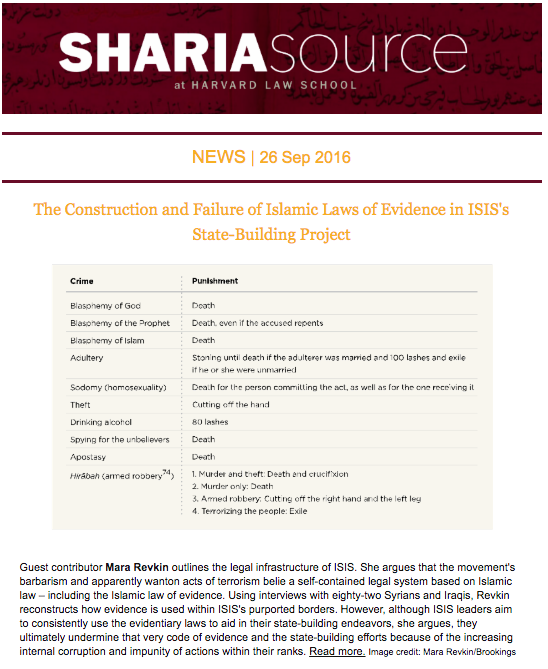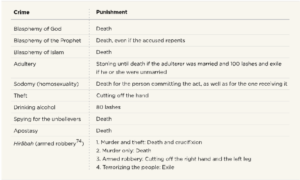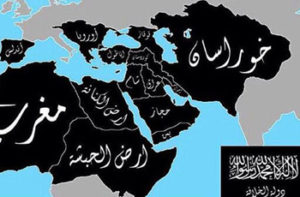
 The Construction and Failure of Islamic Laws of Evidence in ISIS’s State-Building Project Guest contributor Mara Revkin outlines the legal infrastructure of ISIS. She argues that the movement’s barbarism and apparently wanton acts of terrorism belie a self-contained legal system based on Islamic law – including the Islamic law of evidence. Using interviews with eighty-two Syrians and Iraqis, Revkin reconstructs how evidence is used within ISIS’s purported borders. However, although ISIS leaders aim to consistently use the evidentiary laws to aid in their state-building endeavors, she argues, they ultimately undermine that very code of evidence and the state-building efforts because of the increasing internal corruption and impunity of actions within their ranks. Read more. Image credit: Mara Revkin/Brookings
The Construction and Failure of Islamic Laws of Evidence in ISIS’s State-Building Project Guest contributor Mara Revkin outlines the legal infrastructure of ISIS. She argues that the movement’s barbarism and apparently wanton acts of terrorism belie a self-contained legal system based on Islamic law – including the Islamic law of evidence. Using interviews with eighty-two Syrians and Iraqis, Revkin reconstructs how evidence is used within ISIS’s purported borders. However, although ISIS leaders aim to consistently use the evidentiary laws to aid in their state-building endeavors, she argues, they ultimately undermine that very code of evidence and the state-building efforts because of the increasing internal corruption and impunity of actions within their ranks. Read more. Image credit: Mara Revkin/Brookings
 Does ISIS Really Follow the Salafī Version of Islamic Law and Theology? Guest contributor Jacob Olidort critically examines ISIS’s claim of adherence to the doctrine of Salafism, a popular orientation among conservative Muslim clerics who attempt to model their actions on a certain vision of law and theology in the early Muslim community. A scholar of modern Salafī thought himself, Olidort concludes that ISIS’s claims are at odds with Salafī doctrine. Contrary to conventional Salafī doctrines, ISIS displays more affinities to politics than theology; many of its state-building activities are at odds with traditionally Salafī teachings, including the very concept of a caliphate. ISIS uses Salafism as a political vehicle, concludes Olidort, to establish credibility for their ambitions. Read more. Image credit: Sudan Tribune
Does ISIS Really Follow the Salafī Version of Islamic Law and Theology? Guest contributor Jacob Olidort critically examines ISIS’s claim of adherence to the doctrine of Salafism, a popular orientation among conservative Muslim clerics who attempt to model their actions on a certain vision of law and theology in the early Muslim community. A scholar of modern Salafī thought himself, Olidort concludes that ISIS’s claims are at odds with Salafī doctrine. Contrary to conventional Salafī doctrines, ISIS displays more affinities to politics than theology; many of its state-building activities are at odds with traditionally Salafī teachings, including the very concept of a caliphate. ISIS uses Salafism as a political vehicle, concludes Olidort, to establish credibility for their ambitions. Read more. Image credit: Sudan Tribune
 In Summary: SHARIAsource Events ILSP: SHARIAsource hosted the first of its lunch discussions on Sep 16, entitled “From Big Law to Public Service in the White House,” featuring Raheemah Abdulaleem, JD’01, who serves as Associate General Counsel in the Executive Office of the President in the Office of Administration at the White House. Abdulaleem spoke to current HLS students about her first years as a newly minted lawyer in private practice, her later pro bono and civil rights work at the DOJ, and the path that she eventually took to the White House. On Sep 16 – 17, Intisar Rabb and Paul Beran convened with scholars at the workshopActivism, Advocacy, and Scholarship on Islam in the Digital Realm at Boston University’s Pardee School of Global Studies. Hosted by Michael Pregill, the workshop explored new problems and prospects of building out resources in digital Islamic humanities. On Sep 21, SHARIAsource, hosted an open house, where faculty and staff welcomed members of the HLS and University community to the SHARIAsource offices in Austin Hall – which is now open as a research and gathering space for students and scholars working on Islamic law. A full crowd included a mix of JD, LLM, and PhD students, scholars in related fields, law librarians, and members of the wider community with a general interest in Islamic law. Read more. Image Credit: SHARIAsource
In Summary: SHARIAsource Events ILSP: SHARIAsource hosted the first of its lunch discussions on Sep 16, entitled “From Big Law to Public Service in the White House,” featuring Raheemah Abdulaleem, JD’01, who serves as Associate General Counsel in the Executive Office of the President in the Office of Administration at the White House. Abdulaleem spoke to current HLS students about her first years as a newly minted lawyer in private practice, her later pro bono and civil rights work at the DOJ, and the path that she eventually took to the White House. On Sep 16 – 17, Intisar Rabb and Paul Beran convened with scholars at the workshopActivism, Advocacy, and Scholarship on Islam in the Digital Realm at Boston University’s Pardee School of Global Studies. Hosted by Michael Pregill, the workshop explored new problems and prospects of building out resources in digital Islamic humanities. On Sep 21, SHARIAsource, hosted an open house, where faculty and staff welcomed members of the HLS and University community to the SHARIAsource offices in Austin Hall – which is now open as a research and gathering space for students and scholars working on Islamic law. A full crowd included a mix of JD, LLM, and PhD students, scholars in related fields, law librarians, and members of the wider community with a general interest in Islamic law. Read more. Image Credit: SHARIAsource
See the full newsletter.

